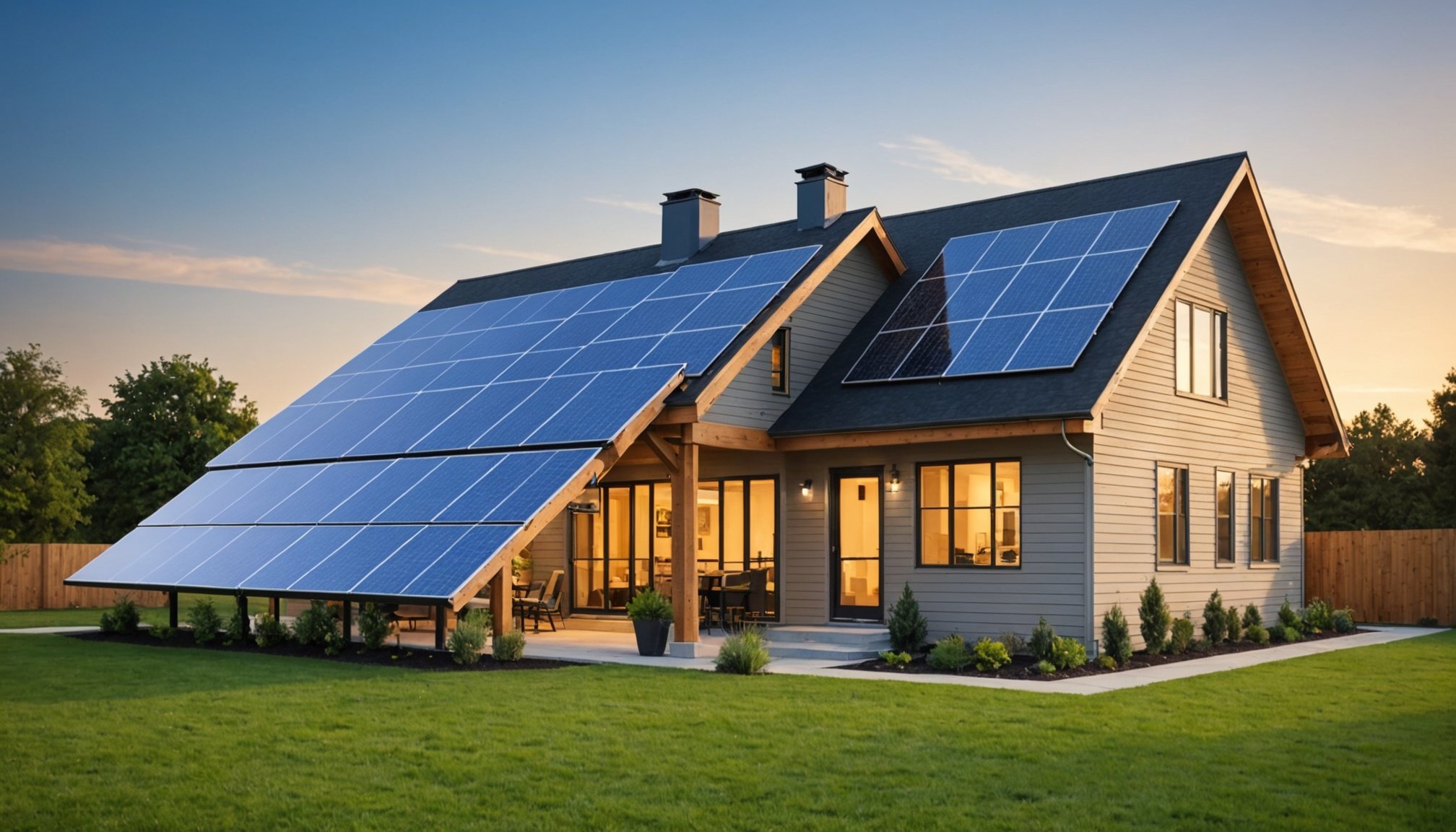Overview of Home Renewable Energy Innovations
In recent years, the interest in home renewable energy solutions has surged, reflecting a shift towards more energy-efficient and sustainable living. The landscape of renewable energy technologies available for homes continues to evolve, offering homeowners innovative ways to reduce their carbon footprint while saving on utility costs. Understanding these technologies is crucial for modern homeowners eager to embrace sustainability.
The Growth of Renewable Energy Solutions
The home renewable energy sector has seen remarkable growth, with diverse technologies now accessible to residential users. These include solar panels, wind turbines, and advanced battery storage systems, each contributing uniquely to energy efficiency. Innovations in these fields mean homeowners can tailor solutions to their specific needs, significantly impacting their energy consumption patterns.
Also to discover : Unlocking success for uk independent musicians: a comprehensive guide to enhancing online visibility
Importance of Energy Efficiency
Energy efficiency stands as a central pillar in the pursuit of sustainability. Utilizing renewable energy sources not only enhances a home’s energy performance but also plays a critical role in decreasing reliance on fossil fuels. This transition fosters both economic and environmental benefits, supporting sustainable lifestyles through reduced energy bills and lower greenhouse gas emissions.
With these advancements, it’s clear that home renewable energy innovations are no longer the future—they are very much a part of today’s reality, offering immense potential for both individual households and the planet as a whole.
Also to see : Exploring the effects of brexit on uk agriculture: navigating challenges and unlocking new opportunities
Solar Energy Solutions
Solar energy is a prominent player in the realm of renewable energy technologies. It provides homeowners with sustainable and eco-friendly solutions to meet their energy needs.
Types of Solar Panels
There are various types of solar panels, each serving different applications. Monocrystalline panels are known for their efficiency and longevity, making them popular for residential use. Polycrystalline panels offer a cost-effective alternative, though they typically have slightly lower efficiency rates. Thin-film panels are lightweight and flexible and are suitable for spaces where traditional panels may not fit.
Efficiency and Installation Considerations
The efficiency of solar panels depends on several factors, including the angle of installation, the amount of sunlight available, and temperature conditions. Optimal installation requires panels to be placed at an angle that maximises exposure to sunlight throughout the year. Ensuring they are free from shadows or obstructions is crucial for maintaining high efficiency.
Financial Incentives and Returns on Investment
Investment in solar energy is bolstered by financial incentives such as tax credits and rebates. These incentives significantly reduce the initial cost and improve the return on investment over time. Homeowners can expect long-term savings on energy bills, making solar energy an economically viable choice.
Wind Energy Alternatives
Harnessing wind energy through wind turbines presents a viable path for renewable energy sources at home. Unlike traditional systems, micro wind systems are tailored for residential use, offering an eco-friendly energy solution.
Understanding Home Wind Turbines
Home wind turbines convert kinetic energy from the wind into electricity. These smaller-scale systems can be installed in backyards and on rooftops, requiring suitable wind conditions to function effectively. An average household might not rely solely on wind, but it provides a valuable supplement to other renewable methods.
Benefits of Small-Scale Wind Energy
The appeal of small-scale wind energy lies in its sustainability and potential to offset energy costs. By integrating wind turbines into home energy plans, homeowners can diversify their renewable sources, consequently enhancing energy efficiency. Notably, wind energy produces zero emissions, reinforcing environmental benefits.
Case Studies of Successful Installations
Successful installations of micro wind systems show promising results worldwide. These examples demonstrate significant reductions in electricity bills and a lower carbon footprint. For instance, in rural settings with strong winds, such systems perform exceptionally well, providing sustainable energy and upholding energy efficiency.
Energy Storage Technologies
In the realm of home renewable energy, battery storage technology plays a vital role. Energy management is enhanced as storage solutions allow homeowners to store excess energy generated from renewable sources like solar and wind. This stored energy can be used during times when these sources are not producing, such as at night or during still weather for wind systems.
Importance of Energy Storage in Homes
The integration of home battery storage systems is essential for maximising the benefits of renewable energy. By storing energy, households can ensure a consistent power supply, reducing reliance on the grid. This capability not only increases energy reliability but also contributes to energy efficiency by decreasing wastage.
Comparison of Energy Storage Systems
When choosing a battery storage system, different technologies can be considered. Lithium-ion batteries are popular due to their high energy density and efficiency. Lead-acid options offer a more affordable solution but with decreased performance. Emerging technologies, like solid-state batteries, promise even greater efficiency and safety.
Future Trends in Energy Storage
Exciting innovations in the pipeline include advancements in energy storage solutions that offer increased capacity and security. As technology evolves, options like flow batteries and enhanced lithium batteries provide promising developments for residential energy management.
Practical Applications and Benefits
Implementing renewable energy technologies in homes offers significant practical applications for varied environments. Solar panels and micro wind systems are increasingly being used to meet a household’s energy needs effectively. By integrating these innovations, homeowners can gain control over their energy supply, reducing dependency on the grid.
One notable benefit is the potential for substantial cost savings. Installing solar panels and battery storage systems not only cuts down electricity bills but also allows for energy independence. Energy management becomes easier as homeowners can monitor usage and optimise efficiency with smart home technology.
Environmental advantages are also significant. Transitioning to renewable energy sources reduces the household’s carbon footprint, contributing to broader sustainability efforts. This shift facilitates a decrease in greenhouse gas emissions, promoting a healthier environment.
Sustainability benefits extend beyond economics and environment. They include the enhancement of home value and alignment with future-forward living standards. By adopting these solutions, homeowners demonstrate commitment to ecological responsibility, which can be attractive in property markets that prioritise green features.
Overall, renewable energy technologies provide diverse practical applications and benefits, encompassing financial, environmental, and societal dimensions. Such forward-thinking approaches encourage a sustainable lifestyle, aligning with global trends toward cleaner energy.
Expert Insights and Guidance
Gaining a deeper understanding of renewable energy can be challenging. However, expert opinions provide valuable direction for homeowners looking to transition towards energy efficiency. Professionals in the field emphasize the significance of assessing home energy needs before selecting specific technologies.
Interviews with Renewable Energy Experts
Experts highlight the importance of viewing renewable installations as part of an integrated energy management plan. They suggest combining solar panels and wind turbines with battery storage for optimum results. This approach not only maximises energy production but also enhances reliability and efficiency.
Tips for Homeowners Transitioning to Renewable Energy
When transitioning to home renewable energy, practical tips can simplify the process. Start by evaluating energy consumption patterns and identifying inefficiencies. Engaging with local providers to explore different innovations and incentives tailored to your area is also essential.
Resources for Further Exploration
Access to comprehensive resources ensures informed decisions. Homeowners can explore government websites for information on financial incentives like tax credits. Numerous non-profit organisations also offer guides on sustainability benefits and practical applications. Utilising these tools can demystify energy technologies and promote a seamless transition to sustainable living.
Future Trends in Renewable Energy
In the evolving field of home renewable energy, significant future innovations promise to reshape how homeowners interact with their energy systems. Emerging energy consumption trends focus on increasing efficiency and reducing resource dependency. Exciting advancements in technology aim to make renewable energy solutions more accessible and effective.
Innovations on the Horizon
The future holds promising developments in solar technology, like photovoltaic paints and highly efficient perovskite cells. These could offer cheaper and more adaptable solutions. Similarly, advancements in smart grids and digital metering allow homeowners to better monitor and manage their energy usage, aligning energy generation with consumption patterns.
Predicted Dynamics in Residential Energy
Experts suggest that energy systems will become increasingly interconnected. This trend points to the growth of shared-community energy solutions and peer-to-peer electricity trading platforms. These innovations facilitate a shift towards decentralized energy consumption, encouraging collaborative energy management and carbon footprint reduction.
Environmental Sustainability Impacts
As these future innovations are adopted, the global move toward renewable energy could substantially enhance environmental sustainability. Reduced emissions and improved resource efficiency are tangible outcomes. By embracing these trends, society could witness a marked decrease in reliance on non-renewable resources, promoting a healthier planet.











